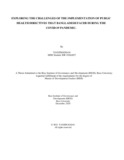| dc.contributor.advisor | Hassan, Mirza M. | |
| dc.contributor.author | Khan, Tanzim | |
| dc.date.accessioned | 2022-08-08T06:07:26Z | |
| dc.date.available | 2022-08-08T06:07:26Z | |
| dc.date.copyright | 2021 | |
| dc.date.issued | 2021-12 | |
| dc.identifier.other | ID 19262027 | |
| dc.identifier.uri | http://hdl.handle.net/10361/17071 | |
| dc.description | This thesis is submitted in partial fulfillment of the requirements for the degree of Masters of Development Studies, 2021. | en_US |
| dc.description | Cataloged from PDF version of thesis. | |
| dc.description | Includes bibliographical references (pages 30-33). | |
| dc.description.abstract | Before the identification of the first case of COVID-19 in Bangladesh (on March 8th, 2020), the healthcare system of Bangladesh was already struggling with multiple challenges and limitations. Therefore, with a weaker healthcare system and one of the highest population densities, it was assumed that Bangladesh was going to face an immense challenge in handling the upcoming pandemic crisis (Jamal, 2021). Like many other countries, the spread and surge of COVID-19 cases in Bangladesh have been devastating. It has not only created a health impact but also has harmed the socio-economic situation and therefore, controlling the spread of the virus is very important. Public health directives such as wearing a face mask, maintaining social distancing, and avoiding public gatherings are very effective measures in restricting the spread of the virus. However, despite knowing the effectiveness of the public health directives and the deadly nature of the virus, the general people are very much unwilling to observe such directives. The state of the pandemic is ongoing for more than a year and still, the government of Bangladesh is facing difficulties in implementing public health directives (Haq, 2021) because of which Bangladesh is facing a challenge to restrict the spread of the virus. Therefore, it raises the as to why Bangladesh had faced a challenge in implementing public health directives.
The conception of pandemic governance has emerged after the spread of the SARS virus and during the COVID-19 pandemic, we saw how South Korea and Japan was successful in implementing policies & healthcare directives by following those governance protocols. However, we also saw the other side of the spectrum where such governance strategy was ignored and countries like the USA and India had struggled to implement policies and health-care directives. In this research, we will try to explore the case of Bangladesh. We will look at how the country tried to handle the pandemic crisis, what strategies were planned and how they were implemented and what challenges were there in implementing the healthcare directives. We will also try to understand how those challenges created a problem in implementing public health directives and thereby, understand why pandemic governance was necessary for implementing public health directives. | en_US |
| dc.description.statementofresponsibility | Tanzim Khan | |
| dc.format.extent | 33 pages | |
| dc.language.iso | en | en_US |
| dc.publisher | Brac University | en_US |
| dc.rights | Brac University theses are protected by copyright. They may be viewed from this source for any purpose, but reproduction or distribution in any format is prohibited without written permission. | |
| dc.subject | Covid-19 | en_US |
| dc.subject | Pandemic | en_US |
| dc.subject | Pandemic Governance | en_US |
| dc.subject | Public health directives | en_US |
| dc.subject | Bangladesh | en_US |
| dc.title | Exploring the challenges of the implementation of public health directives that Bangladesh faced during the Covid-19 pandemic | en_US |
| dc.type | Thesis | en_US |
| dc.contributor.department | BRAC Institute of Governance and Development, Brac University | |
| dc.description.degree | M. Development Studies | |

